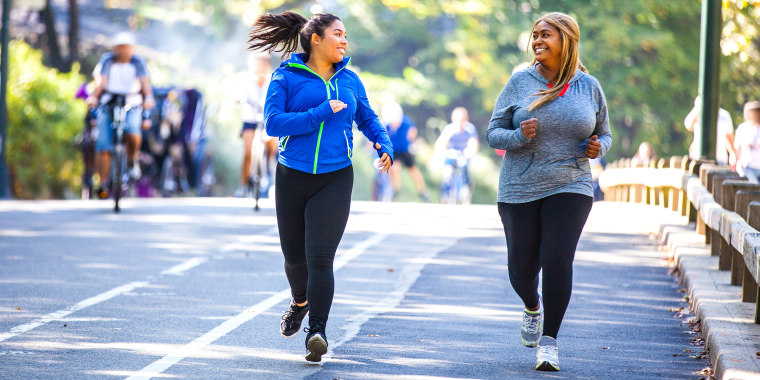Doctors already know exercise is the elixir for good health, stimulating the immune system, boosting metabolism, preventing cancer and providing many other important benefits.
Just four seconds of it has a health payoff and regular movement may slow brain aging by years, not to mention its role in weight loss, heart fitness and mental health.
But how exactly does exercise work in so many wonderful ways?
A small new study in the journal Cell offers a remarkable glimpse into what happens after even a brief workout, showing 9,815 molecules in the blood change, with key pathways stimulated in a series of events researchers likened to a “symphony.”
“Different sections are playing at different times, but when it all comes together, it makes beautiful music,” Michael Snyder, lead author and chairman of the genetics department at Stanford University in California, told TODAY.
“You’re getting such a dramatic change when you exercise and it’s something that permeates throughout your entire system. We think it’s a global regenerator, if you will. It’s a global boost and there aren’t that many things that can give you that.”
For the study, 36 volunteers spent about 10 minutes on a treadmill to reach their peak exercise capacity. Their blood was drawn before the workout, then again two minutes, 15 minutes, 30 minutes and one hour after they stopped.
Snyder and his colleagues didn’t expect to see too much change, but they were taken aback by the results.
A very detailed analysis of the samples showed exercise induced “extensive changes” in over half — 57% — of the 17,662 molecules in the blood.
The immune system received “a big burst” and pathways related to oxidative stress, which wears down the body, were altered, Snyder said, describing the changes as very immediate and beneficial reactions.
Different molecules engaged at different times for energy utilization. Some returned to baseline quickly, others were elevated for some time after exercise, including lipids, which may have long-lasting effects on fat burning, Snyder noted.
Hormones that regulate hunger suppressed appetite right after exercise, but returned to normal later.
Snyder called the entire impact “pretty big." Researchers are still trying to figure out if aerobic exercise is key or if the benefits also happen with yoga, weight lifting and other workouts.
“Exercise is probably the most important thing to help healthy aging,” he said. “It really is a systemic effect. It helps your whole body because it’s affecting all of these different things: your metabolism, your immune function, it really engages your whole system. Exercise is the No. 1 thing for health, even more than food, many would say.”
People who stay inactive are “missing all these goodies that are happening,” he added.
Those who are insulin-resistant may also not be getting the same benefits: In the study, the participants who were insulin-resistant had an immune and metabolic exercise response that was somewhat dampened compared to the other volunteers.
Right now, the best measure of a person’s fitness is a VO2 max test that requires running on a treadmill, which can be time-consuming and expensive.
But the study findings may lead to a simple blood test in a few years that can show the same results, Snyder said.
"We think that's a big deal," he noted. "These kinds of tests could be very powerful because they could be very motivating. If you know your fitness is way below what it should be, you better get out there to exercise."

